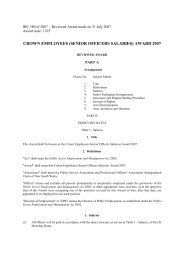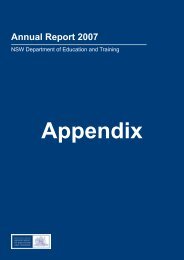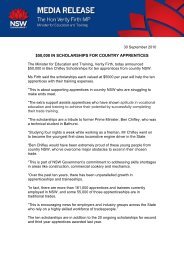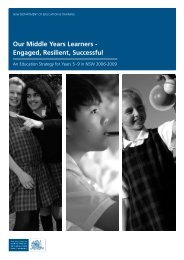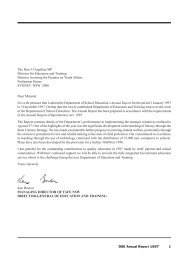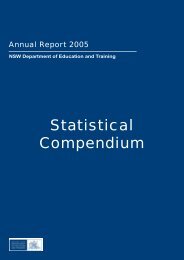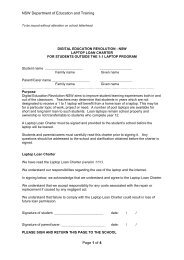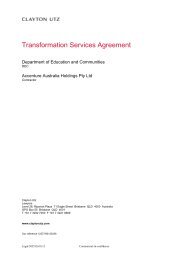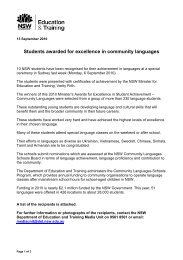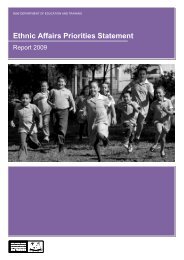1 general conditions of employment - Department of Education and ...
1 general conditions of employment - Department of Education and ...
1 general conditions of employment - Department of Education and ...
You also want an ePaper? Increase the reach of your titles
YUMPU automatically turns print PDFs into web optimized ePapers that Google loves.
9 SUPERANNUATION9.2 FIRST STATE SUPER (FSS)9.2.1 INTRODUCTIONFirst State Super (FSS) is the Government superannuation scheme set up to accept <strong>and</strong> managethe compulsory superannuation contributions that public sector employers are required to makefor their employees in terms <strong>of</strong> the Commonwealth superannuation guarantee legislation. FSSwas established by the First State Superannuation Act 1992 <strong>and</strong> is administered by Pillar onbehalf <strong>of</strong> the scheme’s Trustee.9.2.2 MEMBERSHIP OF FSSAfter the State Authorities Superannuation Scheme (SASS) closed on 18 December 1992, newemployees automatically became members <strong>of</strong> FSS if they were aged under 65 years <strong>and</strong> were notmembers <strong>of</strong> one <strong>of</strong> the previous schemes (an exception would be staff who are members <strong>of</strong> SSSor SASS <strong>and</strong> are also employed as a casual).Contributions cease at age 70. This age will be 75 from 1 July 2007. The employer obligation topay 9% <strong>of</strong> an employee’s superable salary by way <strong>of</strong> superannuation guarantee contribution,direct to the employee’s fund <strong>of</strong> choice, ceases once an employee turns 70 years <strong>of</strong> age.Thereafter the 9% is paid as a taxable allowance <strong>and</strong> is included in the gross weekly incomepayments. This allowance may be ‘salary sacrificed’ for superannuation if the employee sochooses until the employee turns 75 years <strong>of</strong> age.Members <strong>of</strong> the closed schemes can choose to make personal ("top up") contributions to FSS.9.2.3 CONTRIBUTIONS TO FSS9.2.3.1 Employer ContributionsThe employer’s contribution is based on the total earnings for ordinary hours <strong>of</strong> work plusany earnings from shift loading. Overtime <strong>and</strong> lump sum payments on termination <strong>of</strong><strong>employment</strong> are not included (for more information refer to the Taxation Office ruling,Superannuation Guarantee Ruling: Ordinary Time Earnings).The contribution required to be made to FSS is 9% <strong>of</strong> ordinary time earnings from 1 July2002.FSS is unable to accept contributions for an employee who has reached age 70.9.2.3.2 Personal ContributionsFSS members can add to their existing scheme entitlements by making personalcontributions from their after-tax pay to FSS. FSS also accepts Eligible TerminationPayments rolled over from another superannuation or rollover fund.Personal contributions (there is no minimum contribution) can be made by regulardeductions from after-tax pay or by single payments made at any time (the member canmake this payment directly to FSS). To authorise deductions from pay, it is necessary t<strong>of</strong>ill in a Payroll Deduction Authority form (contained in the FSS member informationbooklet).Certain limits on personal contributions may apply after a member reaches age 65. FSSH<strong>and</strong>book for non teaching staff in schools Page 9 − 2



